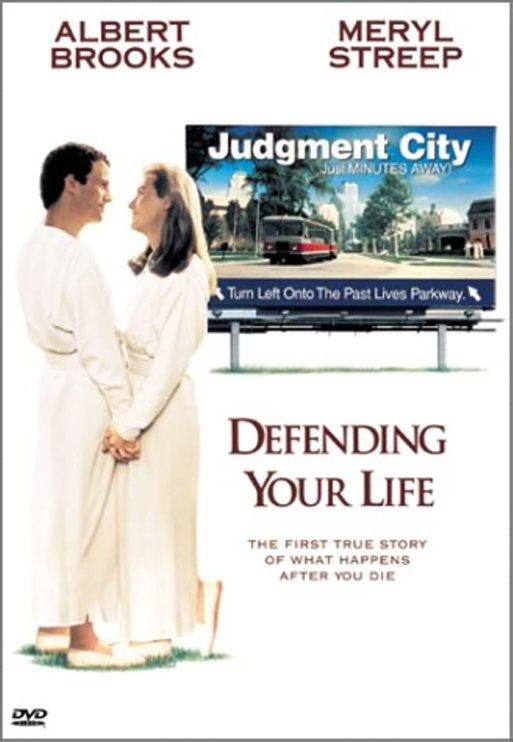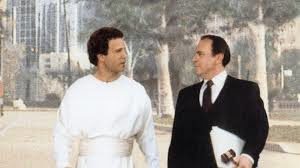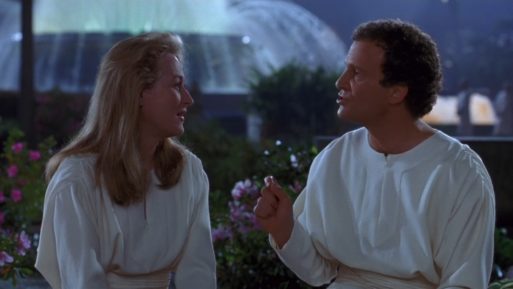 In the arena of films exploring death and dying, I’m taking a look back at 1991, the year that gave us “Defending Your Life,” a high-concept romantic comedy written, directed, and starring the brilliant Albert Brooks. Brooks plays Daniel Miller, a 39- year-old, recently divorced Los Angeles advertising executive, who buys a new BMW and promptly gets into a collision with an oncoming bus. He dies in the accident and wakes up in Judgment City, where the rest of the film takes place.
In the arena of films exploring death and dying, I’m taking a look back at 1991, the year that gave us “Defending Your Life,” a high-concept romantic comedy written, directed, and starring the brilliant Albert Brooks. Brooks plays Daniel Miller, a 39- year-old, recently divorced Los Angeles advertising executive, who buys a new BMW and promptly gets into a collision with an oncoming bus. He dies in the accident and wakes up in Judgment City, where the rest of the film takes place.
Judgment City is an afterlife way-station populated by the recently dead from the Western half of the United States. During their stay in Judgment City, the recently dead have their lives on Earth examined in a court-like setting, and judges decide if they will move on to a higher plane of existence or will return to earth to be reborn as someone else.
Judgment City has a block of hotels where the newly dead reside during their stay. It features bowling alleys, comedy clubs, and restaurants where the food is all-you-can-eat and doesn’t cause weight gain. During the judicial process, two judges preside over each case, while a defense attorney and a prosecutor battle it out. Each tries to prove that the defendant is either ready to move on to the higher plane of existence or needs to return to earth to learn the lessons they didn’t master in this life. Both defense attorney and prosecutor use video footage from the defendant’s life to make their case. Outtakes are pulled from select days in the defendant’s life to highlight moments that illustrate their character.
The footage from Daniel’s life seems to reveal that he was ruled by fear. He needs to prove that he did, in fact, learn to conquer his fears as his life progressed, enough so that he is ready to ascend to the next level and doesn’t need to return to earth and start all over.

Credit: timepilgrims.com
Daniel’s defense attorney, Bob Diamond, played by Rip Torn, explains to Daniel that humans, who use such a small percentage of their brains (three to five percent), spend most of their lives devoted to fear. “Fear,” he explains, “is like a giant fog. It sits on your brain and blocks everything — real feelings, true happiness, real joy. They can’t get through that fog. But you lift it, and buddy, you’re in for the ride of your life.”
At the end of the nine days of Daniel’s trial, the judges conclude that Daniel has not been able to lift the fog of fear and decide that he needs to be sent back. However, during his time in Judgment City, Daniel has met and fallen in love with Julia, played by Meryl Streep. Julia is a woman whose bravery and kindness is swaying her own judges in the opposite direction. She seems unequivocally ready to level up onto the higher plane. In the film’s final act, Daniel has the opportunity to prove, through his love for Julia, that he has learned a thing or two about bravery and may actually be ready to move on.
I won’t ruin the ending; I’ll just say watch the movie. It’s worth it.

Albert Brooks and Meryl Streep in a scene from “Defending Your Life”
Credit: collider.com
In an interview with Rolling Stone, Albert Brooks said, “I don’t know how, where, and why the idea for “Defending Your Life” began; the idea had been bouncing around for a while. Stories like that sort of have to bounce. They don’t come out of nowhere. I went through my own period of life with sort of everything turning upside down, and wondering, why is it this way? I went from being unafraid at the beginning of my career, in my late 20s, [to] being like the Roadrunner; I looked down and I didn’t see anything. You don’t wake up one day and say, “Earth ain’t the best place to be. That’s a brewing type of feeling.”
This funny, touching movie about the afterlife is a movie with a strong message about how to live. It asks the viewer to reflect on the meaning of courage and on how much time we spend worrying and trying to keep ourselves safe, to our own detriment. The message is a life-affirming call to take risks, to free ourselves from the fog.

 “Defending Your Life” by Albert Brooks
“Defending Your Life” by Albert Brooks



 Composting Bodies Is Now Legal in a Dozen States
Composting Bodies Is Now Legal in a Dozen States















